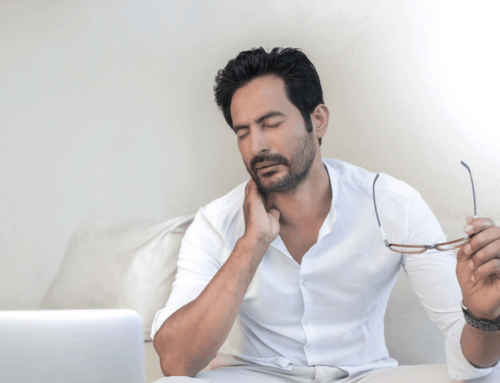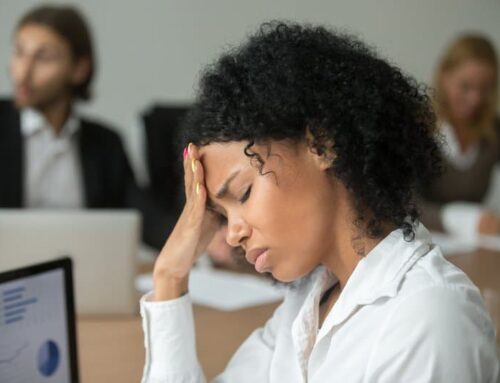Chronic pain is that which persists beyond the usual time it takes for an injury or sickness to heal. This pain may continue for more than three months. In addition to the pain itself, other secondary symptoms of chronic pain include high levels of stress hormones, low energy, muscle pain, poor mental and physical performance and mood disorders. Finding the right chronic pain management solution is key to long-term relief.
Chronic Pain, Depression, and Statistics
In fact, people who have chronic pain also very often struggle with depression:
- According to the American Pain Foundation (APF), about 32 million Americans report having pain lasting longer than a year.
- Patients whose pain restricts their freedom are more likely to be depressed.
- Research indicates that approximately 30% to 50% of patients with chronic pain also cope with depression.
- About 25% to more than 50% of the patients who complain to their health providers have depression.
- Approximately 65% of depressed people complain of pain.
These statistics indicate that chronic pain is not just a physical condition, but also has a strong emotional component. Without proper chronic pain management, your pain can have a significant influence on your mood, thoughts, and ultimately, with the ability to heal.

Is There a Link Between Pain and Depression?
Sometimes doctors find it difficult to evaluate whether chronic pain causes depression or vice versa. For instance, patients who have chronic pain have a high chance of developing symptoms of depression, while those with depression are also likely to develop chronic pain.
Depression can often lead to unsolved pain, such as back pains and headaches, and depressed patients might struggle to maintain or improve their physical health. In turn, chronic pain causes increased stress, difficulties in sleeping, and guilt or hopelessness feelings linked with depression. These influences can produce a depression to pain cycle that is difficult to break.
Even though depression can further incapacitate patients with chronic pain, they are less likely to identify and mention symptoms of depression with their health provider. Statistics reveal that almost 50% of depressed patients who consult a physician only complain about physical symptoms.
Additionally, people who have tried various ways to treat chronic pain but fail to recover completely, often find that this leads to depression. Sometimes, the resulting symptoms of depression can be dangerous because they can magnify the pain, making everyday living difficult. Some people may damage important relationships and face loss of employment. A chronic pain management solution tailored to your needs can help break the depression-pain cycle.
Understanding the Link Between Chronic Pain and Depression
Depression and chronic pain are intertwined with one another largely because of the way stress functions in the body. During painful moments, the areas of your brain that react to stress get stimulated. Your brain activates the fight-or-flight mode and prepares to drive away whatever is producing the pain. Usually, if the pain stops, those stress signals deactivate, and the body returns to a relaxed state.
However, the fight or flight signals never deactivate if you struggle with chronic pain. The result causes the nervous system to remain in a high alert steady condition. Too much stress without rest wears out the body, which creates a risk for depression. In this scenario, discovering proper chronic pain management is the first step to preventing or fighting depression.
Alternatively, chronic pain and depression share similar neurotransmitters (body chemicals messengers) that allow the transference of impulses between nerves. These two conditions also share some similar nerve pathways in the spinal cord and brain.
Studies indicate that chronic pain is more than a side effect of depression or vice-versa. The two diagnoses are so interlinked that separating them for treatment is difficult to impossible. Although one can feel pain without falling into a depression, it is likely that if you struggle with chronic pain, you will also encounter depression as time goes on.
Symptoms of Chronic Pain Associated with Depression:
- Lack of interest in activities
- Changes in appetite
- Feelings of guilt or hopelessness
- Irritability
- Changes in sleep patterns
- Lack of energy
- Trouble concentrating
- Suicidal thoughts
Available Treatment Options
Fortunately, chronic pain and depression can both be treated at the MidSouth Pain Treatment Center. Below are some of the available treatment options available for chronic pain management.
- Psychotherapy. Also known as talk therapy, psychotherapy and particularly cognitive behavioral therapy, can help patients to change their thinking patterns and learn how to deal with symptoms of depression and pain in a more positive way.
- Prescription Medication. Doctors can prescribe standard painkillers and antidepressant medications to help prevent symptoms. Opioids, however, are extremely addictive, and its overuse has lead to a major crisis affecting all demographics in America. Before taking these drugs, we recommend you talk to our doctors first to know the risks of substance use and abuse. Additionally, standard antidepressants may take many weeks to work, so an interim strategy to help for this gap period is recommended.
- Stress-reduction skills. These skills can include positive thinking, muscle relaxation, meditation and yoga, exercise, among others. Our pain specialists will provide the best recommendations to match your needs and interests.
- Outpatient pain programs. Our advanced interventional pain management techniques offer often immediate and long-term support when chronic pain and depression get severe.

Finding Your Chronic Pain Management Solution
If you think that you might have chronic pain associated with depression, or vice-versa, don’t hesitate to call our MidSouth Pain Treatment Center to get help before your symptoms worsen. Our qualified doctors will address both the emotional and physical symptoms you might be experiencing. Visit us today, and you will find our treatment options that can help you regain control over your mind, body, and spirit. Getting the right treatment from us can help you start enjoying life again.
Discover how you can start finding relief from your chronic pain and associated depression, especially if you have tried other treatment options without any success. For more information contact us now at the MidSouth Pain Treatment Center or call us at (866) 707-1942.





